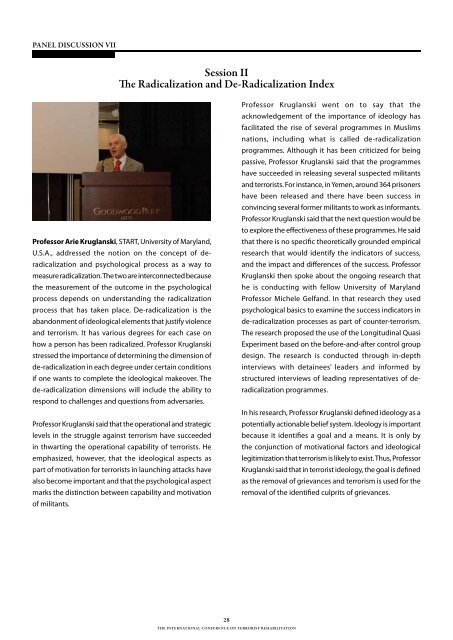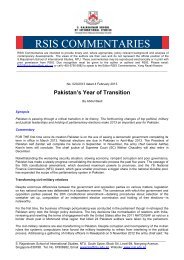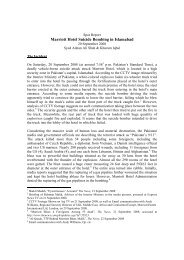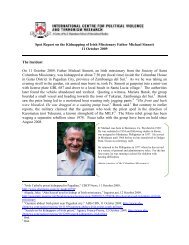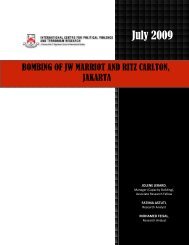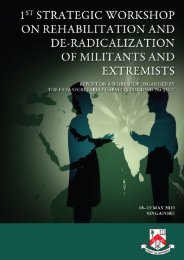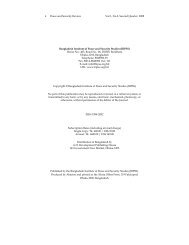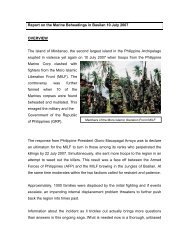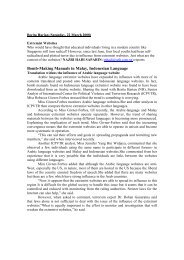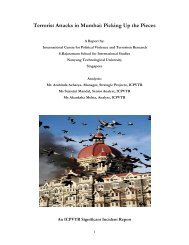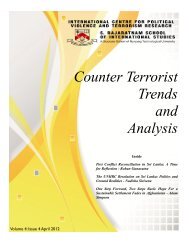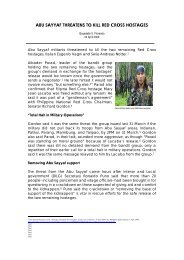International Conference On Terrorist Rehabilitation
International Conference On Terrorist Rehabilitation
International Conference On Terrorist Rehabilitation
You also want an ePaper? Increase the reach of your titles
YUMPU automatically turns print PDFs into web optimized ePapers that Google loves.
PANEL DISCUSSION VII<br />
Session II<br />
The Radicalization and De-Radicalization Index<br />
Professor Arie Kruglanski, START, University of Maryland,<br />
U.S.A., addressed the notion on the concept of deradicalization<br />
and psychological process as a way to<br />
measure radicalization. The two are interconnected because<br />
the measurement of the outcome in the psychological<br />
process depends on understanding the radicalization<br />
process that has taken place. De-radicalization is the<br />
abandonment of ideological elements that justify violence<br />
and terrorism. It has various degrees for each case on<br />
how a person has been radicalized. Professor Kruglanski<br />
stressed the importance of determining the dimension of<br />
de-radicalization in each degree under certain conditions<br />
if one wants to complete the ideological makeover. The<br />
de-radicalization dimensions will include the ability to<br />
respond to challenges and questions from adversaries.<br />
Professor Kruglanski said that the operational and strategic<br />
levels in the struggle against terrorism have succeeded<br />
in thwarting the operational capability of terrorists. He<br />
emphasized, however, that the ideological aspects as<br />
part of motivation for terrorists in launching attacks have<br />
also become important and that the psychological aspect<br />
marks the distinction between capability and motivation<br />
of militants.<br />
Professor Kruglanski went on to say that the<br />
acknowledgement of the importance of ideology has<br />
facilitated the rise of several programmes in Muslims<br />
nations, including what is called de-radicalization<br />
programmes. Although it has been criticized for being<br />
passive, Professor Kruglanski said that the programmes<br />
have succeeded in releasing several suspected militants<br />
and terrorists. For instance, in Yemen, around 364 prisoners<br />
have been released and there have been success in<br />
convincing several former militants to work as informants.<br />
Professor Kruglanski said that the next question would be<br />
to explore the effectiveness of these programmes. He said<br />
that there is no specific theoretically grounded empirical<br />
research that would identify the indicators of success,<br />
and the impact and differences of the success. Professor<br />
Kruglanski then spoke about the ongoing research that<br />
he is conducting with fellow University of Maryland<br />
Professor Michele Gelfand. In that research they used<br />
psychological basics to examine the success indicators in<br />
de-radicalization processes as part of counter-terrorism.<br />
The research proposed the use of the Longitudinal Quasi<br />
Experiment based on the before-and-after control group<br />
design. The research is conducted through in-depth<br />
interviews with detainees’ leaders and informed by<br />
structured interviews of leading representatives of deradicalization<br />
programmes.<br />
In his research, Professor Kruglanski defined ideology as a<br />
potentially actionable belief system. Ideology is important<br />
because it identifies a goal and a means. It is only by<br />
the conjunction of motivational factors and ideological<br />
legitimization that terrorism is likely to exist. Thus, Professor<br />
Kruglanski said that in terrorist ideology, the goal is defined<br />
as the removal of grievances and terrorism is used for the<br />
removal of the identified culprits of grievances.<br />
28<br />
THE INTERNATIONAL CONFERENCE ON TERRORIST REHABILITATION


